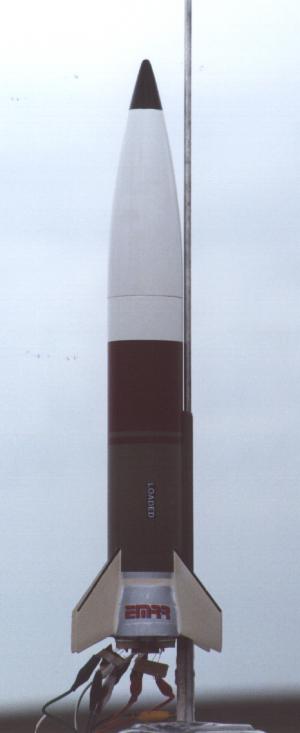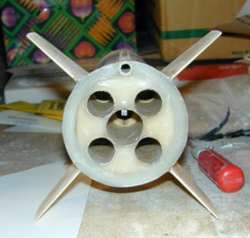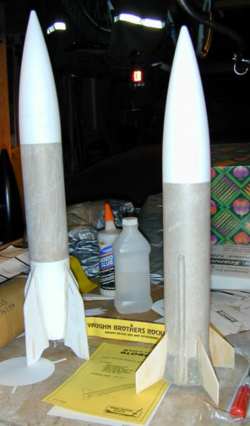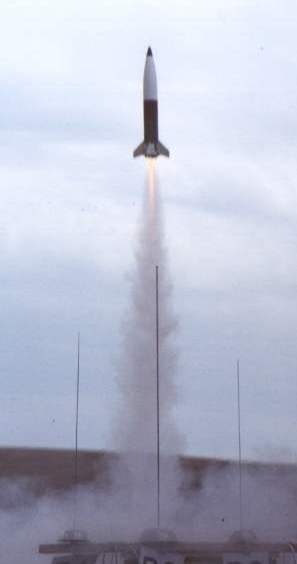Vaughn Brothers Stretch Blobbo to Aries Modification
Modification - Stretch Blobbo to Aries
Contributed by Frank Ross
| Published: | 2010-04-21 |
| Manufacturer: | Modification |
 Brief:
Brief:
VB Stretch Blobbo bashed into a sport-scale Aries sounding rocket based on Pete Alway's "Scale Bash" (Saturn Press)
Modifications:
I was fortunate enough to be the winner of EMRR's Rocket Give-Away contest and was given the opportunity to select any rocket kit from LawnDart under $25. I was interested in building a clustered-motor rocket and had been poking around through Pete Alway's "Scale Bash" and decided that the Vaughn Bros. Stretch Blobbo was a perfect candidate for just such a kit-bash. Because of the short tube length (despite the "stretch" factor of this Blobbo kit) I was limited to only a few choices from the book. I noticed the 4-motor configuration of the Aries sounding rocket and my mind was quickly made up.
I wanted to use as much of the material from the kit as possible but given that the Blobbo kit is a three-finned rocket and the Aries was of the four-finned variety I was obligated to put aside the G10 fins (to be used on a yet-to-be-designed scratch build). I used the fin template from the book and cut out four Aries fins from a basswood slat. I also wanted to do a four-motor design that would resemble the actual rocket but rather than toss the kit's motor mount I instead decided to adapt the centering rings to a five motor design -- one center 24mm surrounded by four 18mm mounts. This configuration also gives the most flexibility in motor selection as I can fly the rocket using anywhere from one to five motors as desired.
The Aries' plans also call for a body transition at the rear of the airframe. For this, I used the transition template from "Scale Bash" and built the cone-shaped transition plus a rear centering ring from card stock.
The Aries also has a prominent external conduit on the airframe for which the book suggests 3/16" wood dowel. Instead I used a 3/16" launch lug to double as the conduit and functional launch lug. I extended the lug to the rear of the body tube and cut a hole for it through the rear transition and ring.
Lastly, the body tube of the Stretch Blobbo is just slightly too long for an accurate scale-sized Aries so I cut the tube down to 11-3/8" per the book's instructions.
 I started by building the five-motor mount from the included parts with the addition of four 18mm motor tubes. I was concerned that I would not be able to cut the additional 18mm holes in the rings without breaking the thin basswood so I glued a card-stock ring to each of the basswood rings for additional support. I was then able to cut the holes and assemble the mount without problems and after filleting the tubes and rings I had a rock-solid cluster mount.
I started by building the five-motor mount from the included parts with the addition of four 18mm motor tubes. I was concerned that I would not be able to cut the additional 18mm holes in the rings without breaking the thin basswood so I glued a card-stock ring to each of the basswood rings for additional support. I was then able to cut the holes and assemble the mount without problems and after filleting the tubes and rings I had a rock-solid cluster mount.
I used the included braided-steel shock cord anchor as intended, looped around the center 24mm motor tube. I used a fin-alignment guide to mark the BT-80 body tube and cut slots for the thru-the-wall fin mounts. Because the motors of the Aries are in-line with the fins the TTW fin tabs are quite short, around 1/32" but I figured that even a small TTW tab would be better than flush-mounted fins. In hindsight this is probably overkill, that is because the next step of adding the cardstock body transition at the rear of the airframe with slots for the fins created an effective TTW fin mount.
The remainder of the rocket went together as it would for the original kit. Additional nose weight is also required to create a stable rocket, I added a couple ounces of lead sinkers and epoxy to move the CG forward a few inches. I would recommend clay weight so that, depending on which motor configuration is flown, weight can be added or removed to appropriately balance the rocket.
To finish the rocket I used 30-minute epoxy for fin fillets as well as to smooth the transition from the body tube to the card-stock transition. I used krylon primer and paints to match the paint scheme from the book as well as I could. I also printed a "LOADED" decal per the book (as well as an EMRR decal) on my inkjet printer from a "super-cal water-slide decal" kit.
 Construction:
Construction:
Parts Needed:
- (1) PNC-80 Nose Cone
- (1) 15" BT-80 airframe tube
- (1) 1/8" Launch Lug
- (3) G10 fins
- (1) 18" Nylon chute
- (1) ~24" 1/4" elastic shock cord
- (1) ~8" braided steel shock cord anchor
- (1) 24mm motor mount tube
- (2) basswood centering rings (2.6" to 24mm)
As far as the kit goes, I was very happy with the quality of the Vaughn Brother's kit, I think it's a darned-good value considering the G10 fins and nylon chute with a price comparable to equivalent Estes kits. All the parts were of good quality and in very good shape. The instructions (even though I did not use them to the letter) were clear and concise. As far as the kit-bash goes, I think it's a pretty straight forward conversion. I like the idea of using as many of the included components as possible -- I used all but the G10 fins and the included launch lug. The only additional components needed are the new basswood fins, the 3/16" conduit/lug, the card-stock transition, and the additional motor tubes. The paint scheme of the Aries requires that several masks and coats of different colors are used, this probably raises the skill-level of this kit-bash but if you're patient it is not difficult to accomplish a decent finish.
 Flight:
Flight:
I sim'ed the Aries bash in Rocksim V5.0 (handy cluster wizard) with a variety of motor configurations and there are many motor combinations and single motors that appear ideal in simulation. I originally planned to start off with a single E28 24mm RMS but changed my mind at the field and stuffed in a D12-7 and 4 x C6 outboards, what the heck? I had a set of alligator clips to connect the single launch wire to all five motors in the cluster. I took a quick pre-launch photo and stepped clear. All five motors ignited simultaneously and the rocket flew perfectly straight to about 600' when the nose cone popped and abruptly halted the rocket's ascent. The nose cone and chute separated from the body which plummeted to the ground as the nose drifted gently down. Remarkably the fins and lower tube were undamaged aside from some paint bubbles caused by the heat of the motor cluster. The top of the tube is marred by a very straight, clean zipper of the braided wire anchor through the top 4 inches of the airframe -- easily repairable with a tube coupler and new section of airframe. What happened? In my haste switching my motor selection on the field I stuffed a C6-0 motor in with the other C6-7 outboards -- oops.
Summary:
The Stretch Blobbo is an excellent quality kit both as designed and as a candidate for a kit-bash or mod. The Aries bash as described is quite simple and inexpensive and makes a very sharp and versatile rocket.
Related Products
 |
 |